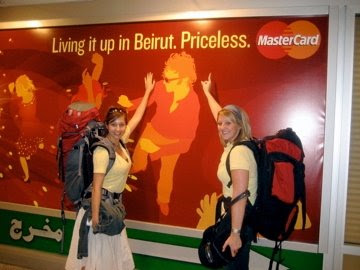I'm not sure if the air is actually abuzz with tension or if it just seems that way because I live in a dorm full of 80 girls, making it easy for us to run from room to room and across the lobby to pass on the latest tidbit or repeat the same story yet again. The top of the list today: today's expected strike in Cairo.
Planned for today is what I have been told will be the largest organized strike in Egypt, ever. Since I arrived at the end of January, the price of food has been steadily increasing. There have been outbreaks of violence in government bread lines because it is so profitable to resell flour (due to the national shortage of wheat) that bakeries often sell what should be feeding Egypt's poor on the black market, meaning that there's usually not enough for those who aren't in the front of the lines.
From what I can gather, today's strike began with the doctors, who are public sector employees in Egypt, and who generally earn around 400 to 700 pounds per month, which is between $80 and $140. Some prices for comparison:
Basket of bread: 3-5 pounds
Can of Coca-Cola: 6 pounds
Taxi ride across Cairo: 25 pounds
Stella, the standard Egyptian Beer: 20-25 pounds per bottle
A pair of ladies' boots: 110 pounds
Cup of coffee: 10 pounds
The primary complaint is not just that salaries are absurdly low--although they are--but rather that the public sector salaries have not been increased despite the government having raised food prices. (Why the price of food, and the price of other neccessities, like cooking oil, has been skyrocketing is a whole other can of worms that has to do with Egypt selling essentials to Israel despite the domestic shortage because it's more profitable for the government).
The strike began with doctors, and now includes the professors at Cairo University (and other public universities), transit workers (the Metro is supposed to be closed) and other public authorities. People have been encouraged not to do anything that the government generally profits from--including using mobile phones (many of the revenues go to state-owned Mobinil).
The dorm has generally been in a tizzy because we aren't sure whether to go to class. While AUC is not participating in the strike, many individual professors have cancelled classes in solidarity and others have said they will not count students absent today if they skip for moral or safety reasons. I say safety reasons because the demonstration and main strike is expected to occur in front of the largest government building--the behemoth Mugamma--in the largest downtown square--Midan Tahrir ("Liberation"). AUC's campus is across the street.
AUC is generally very concerned about our safety. There are at least 6 security guards at our dorm entrance at any given time, we must fill out forms informing them of our whereabouts at all times, etc. We received e-mails from AUC letting us know that school will be open as usual on Sunday, and the school-sponsored shuttle that runs between campus and our dorm is still operating, so it's quite likely that all the worry is unnecessary. Jillian has to give a presentation today and I have to meet with the ALI director, so both of us are obliged to go. Jillian's close friend, who is Egyptian, said he expected things to be peaceful because the demonstration was organized by white-collar employees and is registered with the authorities, but we will nevertheless heed his advice: "Don't get curious." I will let you know what, if anything, goes down.



